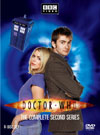DVD Extras (box sets only) include:
Moffat has a good reason for not letting us see the materialization of the TARDIS this time around, so David Tennant now gets his first five stories under his belt with not a single proper materialization in any one of them. Weird. In the end, not very satisfactory. But, on the bright side, Tennant is preferable to Christopher Eccleston, and instead of Captain Jack Harkness, we have Mickey Smith. Improvements on both fronts. Yes, Mickey is finally traveling in the TARDIS. If Eccleston were still the Doctor, Mickey would be stealing the whole show at this point, but luckily David Tennant can more than hold his own. Mickey gets a lot of great bits in this story, boosting its ratings with me no end. Good show. Here's lookin' at you, Mick. The hidden underlying premise behind this story is remarkably similar to that of "The Empty Child", and stretches credulity again for much the same reasons. Artificially intelligent servants, in their attempt to help out, become inept in just the right ways to make the situation disastrously worse. ....Yeah. The horrific lengths they go to aren't silly at all... really. Moffat is also heavy on the references to 51st century Earth, as he was back in "The Empty Child", as Robert Holmes was back in "The Talons of Weng-Chiang" (story no. 91). In one sense it helps anchor the crazy premise back to a precedent in "Talons", where it was revealed that the Peking Homunculus was a robot containing the brain of a pig. No accounting for 51st century taste. Then again, according to "Talons", time travel should be much more challenging than is made out in either of Moffat's stories. Maybe we really are in a different universe after all.... Once again, there didn't seem to be any thematic point to this bizarre intellectual pretzel of a setup beyond freaking the audience out, so I found myself feeling detached and disappointed after my first viewing. Then, that night, I had a nightmare about unwanted presences in my bedroom. Okay, Moffat has tapped into something primal and archetypal with his premise, so I'll give him back some points on this one. I'm a converted believer now. Kudos. Even so, it's important to remember that the monsters are but a distraction from the real emotional heart of this tale....
Reinette as Romantic Interest / Companion?Rose had better watch out. Here's yet another more interesting and attractive character for the Doctor to invite on board the TARDIS. Reinette could make such a better companion. And there's so much more going on romantically. Another great opportunity to replace Rose... sadly lost.
As was the case in "The Chase" (story no. 16) and "The Visitation" (story no. 120), the full identity of the setting is not revealed until after the TARDIS dematerializes at the very end, and once again, I'm unconvinced it was a good move. This final clue, if revealed earlier, might have helped convince me that the plot was not quite as silly as it seemed on first viewing. Plus it's more satisfying to give the TARDIS travellers the chance to learn the clue. And perhaps most important of all, it's attempting to be intellectually clever where emotional weight is more readily called for. It felt a bit cheap and unfulfilling to me. But perhaps I'm splitting too many hairs for my own preference. Unlike "The Visitation", Moffat at least sets up his revelation well enough that anyone watching the story will grasp it. Good job.
International Titles:Deutsch: "Das Mädchen im Kamin"Magyar: "Parókás intrikák"Français: "La Cheminée du temps"Русский: "Девушка в камине"Italiano: "Finestre nel tempo"This story has become available on DVD. Click on the Amazon symbol for the location nearest you for pricing and availability:
Note: The full season sets contain commentaries, behind-the-scenes featurettes, and other extras. The smaller volumes only feature the plain episodes. Comments on this article are welcome. You may contact the author from this page:
|









